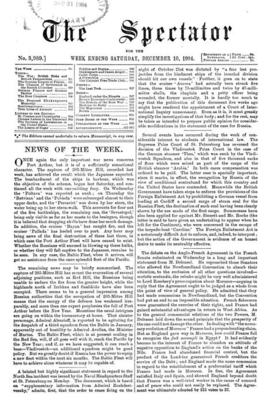The debate on the Anglo-French Agreement in the French Senate
culminated on Wednesday in a long and important statement from M. Delcasse. He reproached those Senators who allowed the Newfoundland Convention to absorb their attention, to the exclusion of all other questions involved—. mutatis mutandis, the rebuke might be very well administered to Lord Rosebery's preoccupation about Morocco—arguing in reply that the Agreement ought to be judged as a whole from the point of view of general policy. He admitted that they had made concessions in Newfoundland, but the Convention had put an end to an impossible situation. French fishermen were guaranteed the exercise of their rights, and France had gained substantial advantages in return in West Africa. As to the general commercial relations of the two Powers, M. Delcasse laid down the sound principle that the prosperity of the one could not damage the other. In dealing with "the neces- sary evolution of Morocco" France had a preponderating claim. But as England gave way in Morocco, how could France fail to recognise the fait accompli in Egypt ? It bad evidently become to the interest of France to abandon an attitude of negative opposition to England's action on the banks of the Nile. France had abandoned financial control, but the product of the Land-tax guaranteed French creditors the service of the Debt; and England made the same concession in regard to the establishment of a preferential tariff whiah France bad made in Morocco. In fine, the Agreement satisfied Italy and Spain, and showed England beyond doubt that France was a well-tried worker in the cause of concord and of peace who could not easily be replaced. The Agree- ment was ultimately adopted by 215 votes to 37.






























































